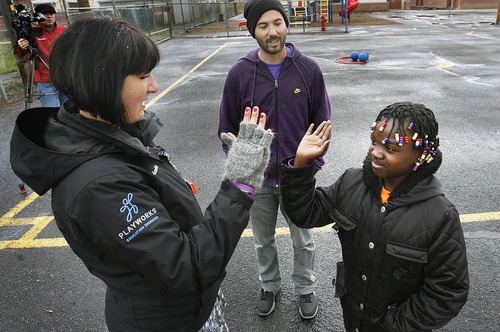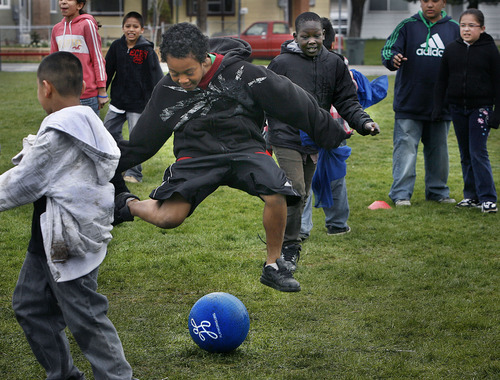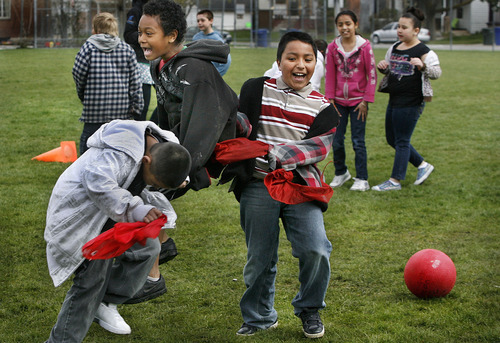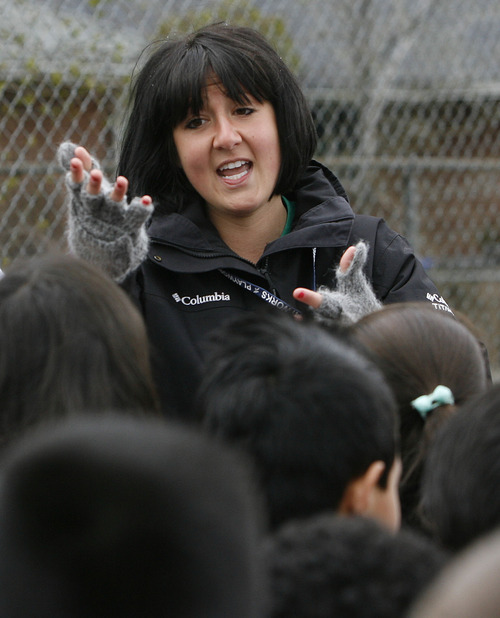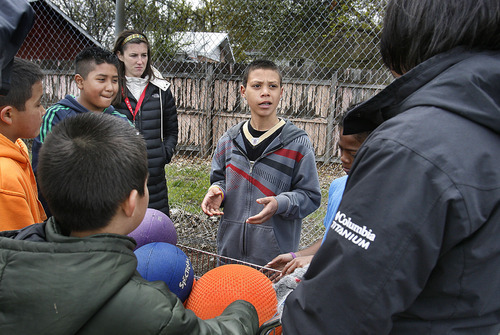This is an archived article that was published on sltrib.com in 2011, and information in the article may be outdated. It is provided only for personal research purposes and may not be reprinted.
Before this week, recess at Salt Lake City's Lincoln Elementary — like recess at many schools — included arguments, tattling and hurt feelings.
This week, it's literally a different ballgame, say teachers and children.
"I used to have power struggles and arguments with kids at recess every day," said Kathleen Ware, the school's physical-education teacher. But Thursday, Ware walked around a playground that was free of drama. No children tearfully tugging on her coat. No screaming fights in which to intervene.
"I have noticed a difference," she said.
The change, they say, is the result of a program called Playworks that's essentially spent the week teaching Lincoln students how to play. The nonprofit, California-based program dispatched coaches to nine Salt Lake County schools this week to teach children games and conflict resolution in hope of transforming recess.
It's something program leaders claim can lead to better focus and socialization in the classroom and beyond, especially at low-income, urban schools where children might not know how to play because they live in neighborhoods where it's not safe to go outside. It will ultimately be up to the schools whether to purchase the program for use beyond this week.
"They want to play so badly, and they don't know how," said Abby Rotwein, a Playworks program coordinator who spent the week at Lincoln, 1090 S. Robert St. "Play helps you develop social skills that carry over into everything."
The idea is that coaches such as Rotwein supervise recess, teaching children how to play games that are fun for all. The games typically have no winners, no losers, no picking teams and no "You're out!"
For many adults, the mere mention of the word "dodgeball" conjures up memories of schoolyard taunts and rubber slapping skin. But students at Lincoln played a different version of the game Thursday: circle dodgeball. They stood in a circle and rolled balls at students in the middle, hoping to hit classmates in the legs. Those who were hit simply switched places with the roller.
When conflicts arise, in this or any other game or situation, the program teaches children to play ro-sham-bo — another name for rock-paper-scissors.
"They need somebody to tell them this is what it's like to be fair, and it's more fun to be fair," Ware said. "To try to dominate games, with one person winning every game, isn't fun."
Fourth-grader Reyna Wolfblack said recess has been much more fun this week.
"If you don't say the rules, it's harder because then other people will take the ball away," said Reyna, 10. "It's easier if you have the rules."
"I think it's better," added fourth-grader Daniel Archuletta, 9. He said before Playworks, recess could get kind of rough.
"The old way, when they weren't here, it was kind of more boring," he said.
The program, should the schools choose to purchase it, costs $55,000, about half of which a school must pay and half of which Playworks pays, thanks to funding from The Robert Wood Johnson Foundation, which aims to improve Americans' health. That money buys a school a full-time coach such as Rotwein to coordinate recess each day, after-school sports, a leadership program and classroom game time.
It's a large chunk of money, especially in tough budget times, but Lincoln Principal Christine Pittam said she's sold. She said the school had half as many discipline problems this week as usual.
"There is a need for this kind of program" at Lincoln, where about 94 percent of students qualify for free or reduced-price meals and about 56 percent are learning English, Pittam said. "Kids are not only using it out here, but they're also taking it back to the classroom."
She said the school can't really afford to buy the program without cutting in other areas, so she's hoping to find grant money. Playworks already serves about 250 low-income schools across the country.
Lara Dean, who teaches English-language classes at Lincoln, said she's already posted her own plea on Facebook: "My school needs $23,000 for one of the best things I've seen in my 20 years of teaching."


